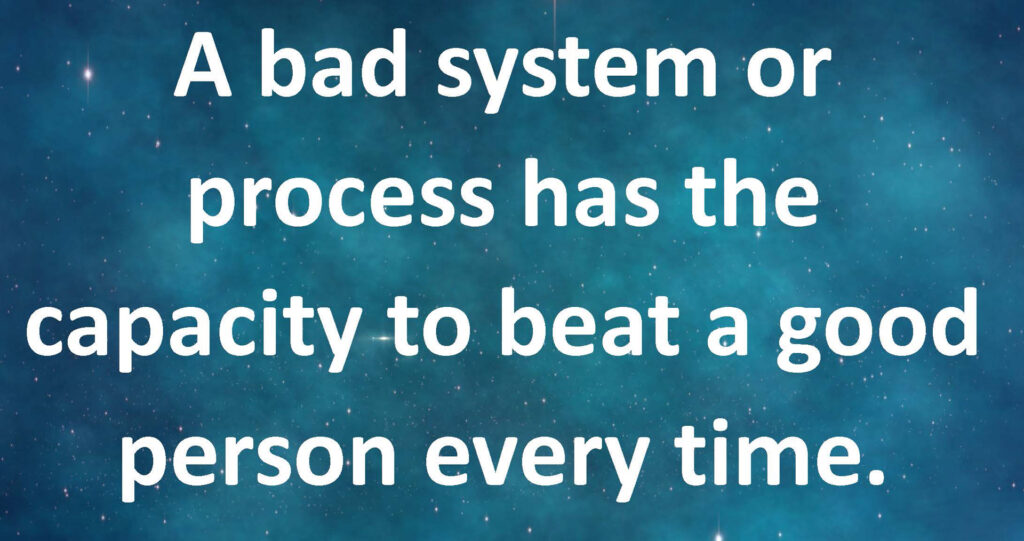Process and Productivity

A process is a repeatable set of structured activities or tasks intended to produce a specific outcome. In business, the required outcome is generally a product, service or part thereof. Processes take place at all levels within an organisation and can be performed by people, machines (IT) or a combination of both. Many processes are transparent to customers, taking place behind the scenes as it were. Nonetheless, the great majority of processes have an impact on customers and employees at some point. A good example of this is the way financial services companies like banks, superannuation funds etc allocate interest and earnings to customer accounts. The ‘back office’ processes that are used to do this aren’t visible to customers but the results quite clearly are.
In general terms there are four types of business processes:
- Operational processes, which focus on executing the core business like sales, production and service delivery.
- Supporting processes, which support the core operational processes, such as accounting and human resources (HR).
- Management processes, which help management to ensure that the operational and supporting processes are conducted appropriately.
- Governance processes, which help ensure the organisation is operating in full compliance with necessary legal regulations, guidelines, and shareholder expectations.
Edwards Deming, renowned for his work on quality systems in the manufacturing and other sectors in post WWII Japan, is quoted as saying that “Eighty-five per cent of the reasons for failure are deficiencies in the systems and process rather than the employee.” In other words, if you are constantly blaming employees for failures and things going wrong, for problems with your products, for poor service and customer complaints, YOU ARE PROBABLY WRONG.

Deming’s findings about the great majority of failures being a result of systems and process failure dovetails perfectly with the Service Profit Chain. 1. In order for employees to deliver value and service excellence to customers, they must have the capability to do so. If processes and procedures limit their ability to deliver to customers, they will invariably find workarounds or become dissatisfied in their role. When this happens their performance declines and they are at higher risk of leaving the organisation.
Process is Inextricably Linked to Productivity.
Productivity is a measure of a business’s ability to efficiently and effectively use its resources to achieve its goals. When processes don’t deliver the required outcomes both efficiency and effectiveness suffer and this in turn impacts organisational productivity.
Escape Velocity for Business has considerable experience conducting Operational Audits or what are also called Process Reviews, across entire organisations and/or specific processes that have raised concern through customer complaints or other means. More details can be found on the Our Services page.
When the Service Profit Chain is implemented properly there should be no need for Operational Audits or Process Reviews. Employees are able to report problems with processes and procedures that are getting in the way of them doing their job. Rather than these concerns being brushed to one side, as they often are, they are fully investigated. Examples of this are provided on the Our Services page.
The number of books that have been written about motivating people and improving the performance of people is just staggering. We are not suggesting that motivation and performance management isn’t important. In fact, we believe it is extremely important. Nonetheless, 85% of problems are caused by systems and processes. Employee motivation and satisfaction are significantly impacted by having to work with poor systems.
Employees will often develop workarounds for poor systems. In one case, Bill experienced in the Financial Services sector, employees were sending quotation/statement emails from their personal company accounts because customers had not received them when employees tried to send them through the system. This is despite repeated complaints to the IT department. This good-hearted approach to help customers could have potentially breached regulatory compliance had it not been picked up in an Operational Audit Bill conducted. Depending on his schedule, he is available to help with Operational Audits, Process and Productivity reviews and improvements. If you’d like to have a chat with him, please drop us a note via our Contact Us page. Bill also has considerable expertise in Manufacturing Execution Systems (MES) and other manufacturing technologies, including Industry 4.0
- Service Profit Chain is a book written by James Heskett et al from Harvard Business School. Bill has successfully introduced the concepts outlined in the book at a number of companies, most notably across Australia and New Zealand at Rockwell Automation.